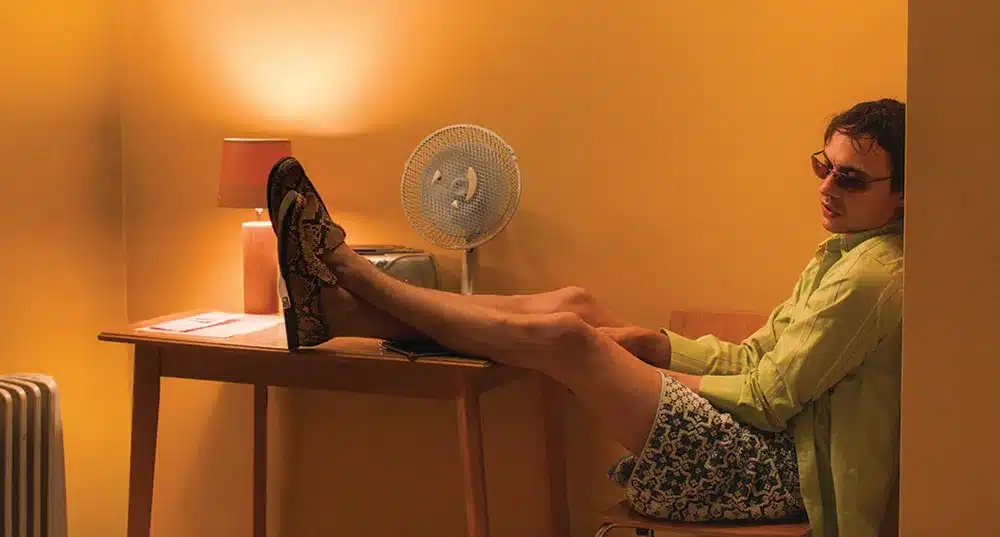





Dir: Harris Dickinson | Cast:Frank Dillane, Megan Northam
Reviewed by Ian Long
Words of Christian piety are intoned as Urchin begins. The speaker is revealed as a woman preaching on a damp inner city street; close to where she stands, a homeless man in his early 30s lies unconscious in a foetal position, half on the pavement and half in the road. This is Mike.
The film follows Mike as he moves through prison, an ex-offenders’ hostel, encounters with social services, a couple of jobs, a tentative relationship with a woman, and more; it takes on a dark momentum as an act of thoughtless generosity puts him back in the hands of demons from which, this time, he may not escape.
Maybe all of this makes Urchin sound like the kind of film beloved of BFI and (previously) UKFC funders, who often seem to fetishise ‘gritty realism’ and equate depictions of working-class hardship with worthiness.
But it’s more than that. Rather than indicting society’s treatment of an innocent victim, it lays bare a largely self-inflicted spiral of descent in a gripping but disturbing character study.
An early incident of gratuitous violence distances Mike from the audience and makes it clear that any charm he might possess is a superficial cover for something dark and deeply flawed. It’s a bold move in narrative terms, and reveals writer/director Harris Dickinson’s cinematic ambitions.
Occasional moments where the viewer is unexpectedly led into otherworldly, sometimes hallucinatory realms elevate the story and give it an almost mystical feel. Their significance isn’t always made clear. Mike’s attempts to listen to and learn from some self-help/anger management recordings seem to be the beginning and end of his spiritual leanings. Maybe the message is that the ‘meanest’ of people are as connected to the cosmic as anyone else; an older woman who reappears a number of times through the story certainly seems to act as some kind of herald or harbinger.
It’s not immediately apparent that Mike is an addict, but this fact is central to his psychology and the story’s trajectory. We see how his unwavering tendency to self-sabotage feeds into and reinforces his addictive behaviour: how he repeatedly detonates the small chances for repentance, advancement and connection that come his way, making bad choices at crucial moments, usually in vain attempts to assert himself.
But Mike isn’t a psychopath. When a performance artist’s physicality triggers memories of his own aggression he has to leave the room, gripped by a remorse which – as with most of his feelings – he has no idea how to manage.
There are numerous compelling performances in the film, some seemingly by non-professionals, and Frank Dillane’s Mike is utterly believable, conveying a temperament that shifts from almost-engaging boyishness to explosive aggression, spaced-out nonchalance to narcotic meltdown.
Urchin has some subtle nods to early Scorseses like Mean Streets and Taxi Driver, and the deep engagement with the addictive mentality goes all the way back to Billy Wilder’s great The Lost Weekend.
Favouring static shots over a moving camera, the film frames Mike in tableaus of a shabby and depleted East London, creating a sense of someone trapped, limited and defined by their environment. Only a sequence set beside the Thames’ lower reaches and those mysteriously foreboding shots of a very different landscape offer some qualified respite.
It was only as the film ended, returning with relentless circularity to an early image, that I realised how deeply I’d been drawn in. I was still in the process of figuring out its protagonist, so it came as a genuine shock to find that no more data was going to be available.
Urchin unsettles because it paints a believable portrait of someone who is not without potential but who seems to have been rendered irredeemable by some internal defect, doomed to rinse and repeat until this is no longer an option. @_i_a_n_l_o_n_g_
URCHIN IS RELEASED IN CINEMAS NATIONWIDE FROM FRIDAY 3rd OCTOBER